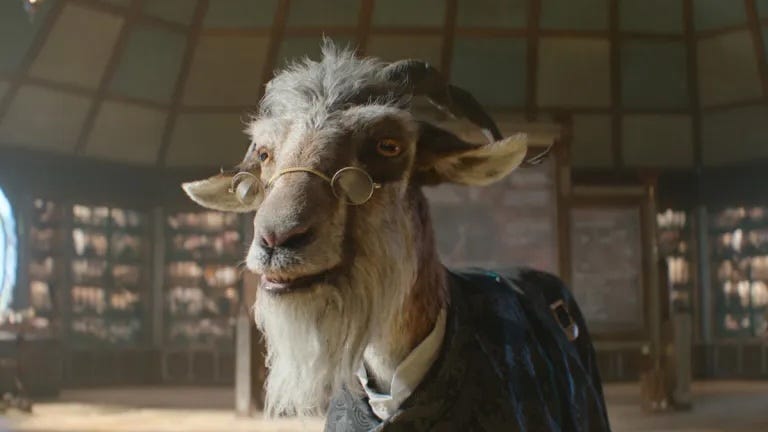A User's Guide to Defying Gravity
Sure, you can read Wicked's stirring anthem as a paean to self-expression. The real stakes of the song are arguably much more radical.
[Warning: Wicked spoilers throughout. Weren’t expecting that, were you?]
I’ll begin this post about Wicked by saying that I haven’t read the book or seen the musical. I have seen the Part I of the film adaptation, so take what I’m about to say with as many grains of salt as seem applicable. Part II may very well undo every theory I’m about to propose about how to read Defying Gravity, the number performed at the climax of Part I.
My thesis: you may think that Defying Gravity is about being defiantly yourself, embracing you are and saying fuck off to the haters. And you wouldn’t be wrong. But you’d be missing the deeper thrust of the song, I think. Within the context of the story, I think Defying Gravity represents two stark lessons in the art of becoming yourself: 1) To become who you can be, you have to give up who you are. 2) it’s not actually all about you—it’s about who you are for others.
Wicked Part I unfolds largely as a prequel to the events that kick off the Wizard of Oz—You know, house from Kansas lands on wicked witch, killing her, Dorothy distraught, munchkins rejoice, Glinda rolls up, adventure ensues. We follow the backstory of witches good and wicked: would you believe they were once college roommates? And frenemies with a tempestuous relationship to boot? Laced into the witches’ Elfaba (wicked) and Glinda (good) coming of age story is an allegory for fascism: in a time in Oz when animals were more like humans, i.e. they could speak, wear clothes, teach university courses, etc, a growing politicized hatred against animals is threatening their very existence, in a creeping menace very explicitly meant to evoke the systematic anti-Semitism and real violence to Jewish people in Nazi-era Germany—e.g. one character is a goat who is also a college professor, a very literal scapegoat.
Elfaba, the not-yet-wicked witch, is as precocious as she is a social outsider. She is outraged by the anti-animal movement, and appalled by the apathy and complacency of her fellow students, and takes actions to rescue a scared lion cub from the Oz anti-animal storm troopers. She is also supernaturally talented as a witch to the extent that the Wizard himself hears about it and invites Elfaba to visit. When Elfaba and Glinda visit the Wizard in The Emerald City, the Wizard gives Elfaba a thick dose of the “all this could be yours” shtick—join me, he says, and sit on the throne and wield power over Oz.
A destiny fulfilled! Talented goth kid makes good—shows those normies back at university how being weird and exceptional can really pay off. Here’s the rub: turns out the whole anti-animal thing was the Wizard’s idea. You see, he explains, ganging up on an internal enemy has just been the perfect way to restore order to Oz. So what’s the big deal?
Elfaba’s refusal of the Wizard’s offer, and the climactic chase and struggle that ensue, culminate in her flying away on her iconic wicked-witch broom while singing Defying Gravity. Part of the song is a duet with Glinda, a vain blonde with no political consciousness to speak of, who is attempting to convince Elfaba to capitulate and literally bring Elfaba back down to earth.
Glinda:
Elphie, listen to me, just say you're sorry
You can still be with the wizard
What you've worked and waited for
You can have all you ever wanted (I know)
Elfaba:
But I don't want it
No, I can't want it anymore
Something has changed within me
Something is not the same
I'm through with playing by the rules of someone else's game
Too late for second-guessing
Too late to go back to sleep
It's time to trust my instincts, close my eyes and leap
It's time to try defying gravity
I think I'll try defying gravity
And you can't pull me down
My point here is that celebrating the courage to strike out on your own is a great thing, but also the acknowledgement of the price you pay, and the ‘why’ that motivates you. Which takes me back to my two-part thesis about what the song is about.
1) To become who you can be, you have to give up who you are.
Elfaba has to give up all that the Wizard has promised. It’s the only way forward for her. The stakes for her selfhood are reminiscent of one of the key lessons of Freudian analysis: that overcoming your neurotic impasse requires a bit of sacrifice. Freudian theory teaches that neurotics often on a deep level ‘love’ their neuroses: you become attached to the fucked up thing you do to an extent that you identify with it. Thus if you want to ‘get better’, it means giving up part of who you are. It requires a leap—like the leap Elfaba takes off the ledge of the Wizard’s castle and into thin air.
2) it’s not actually all about you—it’s about who you are for others.
Her whole life Elfaba has dealt with her own difference—her green skin, her general goth kid vibes—with varying degrees of self-acceptance and shame. Now the stakes are different. Elfaba’s commitment to others—the animals whom she is taking a stand for—is what gives her the ability to overcome her shame and self-doubt about who she is. In other words, no witch is an island.
EPILOGUE
Our late-capitalist culture encourages us to pursue individuality at every turn—a kind of ersatz individuality determined by consumer purchases and media habits. In fact, this mode of individuality is the perfect support for capitalism’s machinery. Wicked, on the other hand, reflects a form of individuality born of a radical commitment to others. That’s something that money can’t buy.



